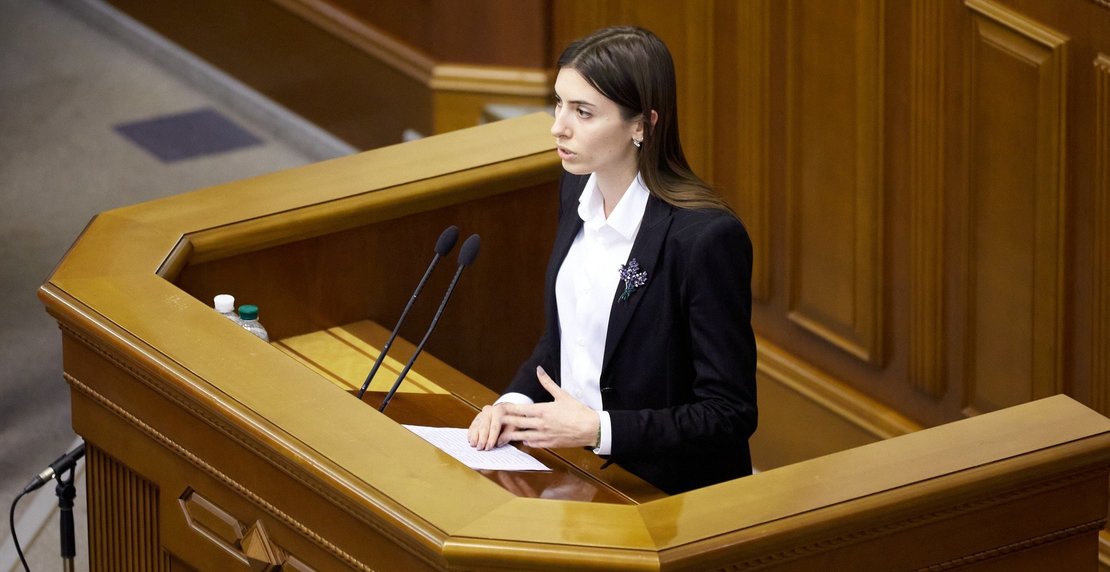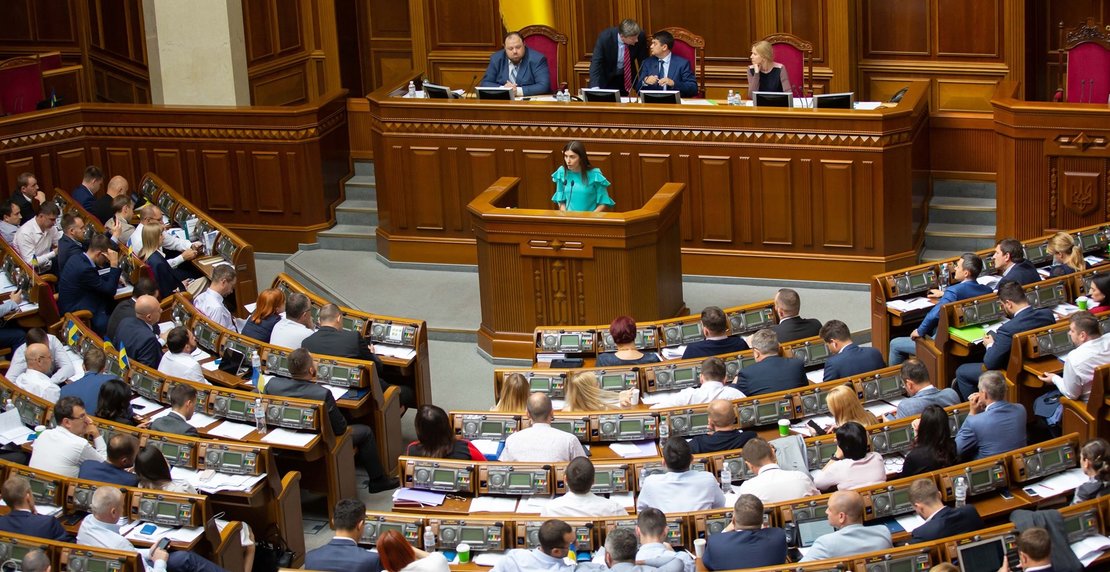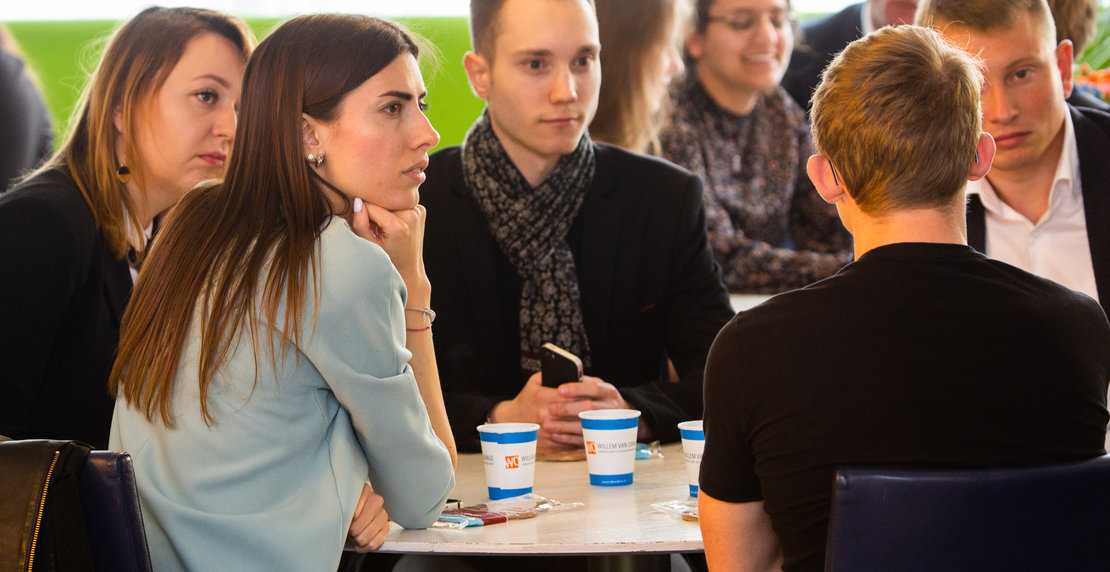
Maria Mezentseva from Ukraine
Text: Mike van Leeuwen (EFF Project Officer)
“My name is Maria Mezentseva. I originally come from Eastern Ukraine, from the city of Kharkiv. The city lays close to the demarcation line and the occupied territory of Donbas. My engagement in politics started at the time of the so-called ‘revolution of dignity’, which had a huge development in May 2014. Before that, I was already engaged in European politics, doing an internship in Brussels where I worked with European political parties and the European parliament. Seeing the developments of the revolution of dignity and the Russian aggression, I decided to relocate back home and be engaged in local politics. I started back in 2015 as a local councillor in my city, Kharkiv. During the elections of 2019, I was elected as a member of the Ukrainian parliament as part of the party of President Zelenski. Since I won the elections in my constituency, I am currently a MP representing the constituency of Kharkiv.
I got in contact with the EFF when I joined the Eastern Partnership Leaders for Change (EPLC) project, which brings participants from Ukraine, Georgia and Moldova together, organised by the EFF, KAS and the UIIP. During this project, I also got the chance to go on a study trip to The Hague.”
What does democracy mean to you?
“When I hear the word ‘democracy’, the first thing that rises in my head is the greek philosophy and the etymology of the word democracy, which means: “The power belonging to the people”. However, with the time and practical experience in the field of politics you understand that democracy is not some notion taken from the vocabulary, but the very difficult process where the interest of all have to be considered. Basically meaning: trying to make everyone happy. For me, this is an ideal picture of democracy.”
What developments do you see that are shaping democracy, in a positive or negative way, in your country?
“We can call ourselves a very young democracy. Ukrainian history and the fight for independence can be traced back for centuries. Our biggest fight is the war of independence which started in 1917 and is still ongoing. We have always been trying to mark ourselves as an independent state, as a self-governed state, and are still doing so.
The democratic processes in Ukraine are happening. The fact that I am elected as a young person who does not represent particular international companies or organizations, having limited financial resources to campaign, shows that our democracy is developing in a positive way. If we look at the international democratic processes, we are working very hard on European integration and cooperation with NATO. Working with the EU and NATO, also improve our democratic processes, making them more transparent and adequate. However, unfortunately we are still suffering from the influence of oligarchs, which is an infection for every democracy. I would conclude that we are doing good, but we can do better.”

What do you like about politics and what motivates you to be active in politics?
“The fact that you, as an individual, can make a difference. Even before I became active in local and national politics, I was always active on the ground, communicating with authorities to make improvements in my area. When I saw that my actions were actually changing something, I was inspired to go further in politics. In local and national politics, seeing that your actions can improve the lives of other people is what really motivates me.”
Of which political achievements are you most proud?
“I would say the ones I could really touch, like a school which we managed to renovate, or standing on the road that was reconstructed. Things that you can physically see and you are using constantly. Also, as a member of parliament, I was the author of a law in the field of European integration, which is leading to a broader opening of the Ukrainian market to the EU market. I do not know if this was my biggest achievement, but for me, it was a big step since this law was waiting in parliament for around 3 years.”
What is the added value of political trainings to your development?
“People to people contacts. During our trip to The Hague, it was not only the experiences of the meetings field trips that added value, but also us sharing our own experiences as local activists, city councillors etc. We were comparing our experiences from different regions in Ukraine, with what we saw in the Netherlands. Moreover, the cooperation and engagement with Christian Democrats from all over Europe are helpful as well. Personally I have joined the Christian Democrats in the council of Europe, in which I am a representative. I did not join them just because I like the name. I know the values, due to the engagement with the CDA and other Christian Democrats.”

What kind of support would you, or other young people active in your country, need more?
“I think we are lacking positive cases and stories. People are not always believing in their own skills. I believe we should show the success stories and show that engagement in politics can make a change. However, I also think the youth are lacking resources. As a candidate in the parliamentary campaign, I can say that I have probably spent all my savings on just printing materials. As a young person, it is difficult to get access to all the advertisement possibilities that others might have.
Lastly, I also think that mentorship is very important. I was, and probably still am, naive when it comes to Ukrainian politics. A person that can guide you, and share their failures and successes would really help. When we were in The Hague, European Elections were very close and I remember I was inspired by the women from your party running for seats in the parliament. With some of them, I am still in contact when I need advice. This personal experience is very touching and a good thing to have.”
